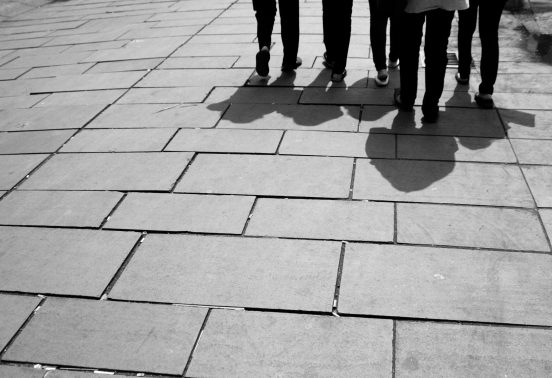- Scholarly Article/Book – Stivale, Charles J. Gilles Deleuze’s ABCs: The Folds of Friendship. Johns Hopkins University Press, Baltimore, Md, 2008;2009;.
- Professional Article/Book/Website – Gallagher, Kathleen. “Can a Classroom be a Family? Race, Space, and the Labour of Care in Urban Teaching.” Canadian Journal of Education, vol. 39, no. 2, 2016, pp. 1.
- This article was interesting as it documented the experiences of a teacher who framed her classroom as a family. This attempt to shift her classroom community towards family dynamics was based in her belief – articulated in the article: “[y]ou can fight all you like, but this is who you’ve got. I didn’t choose you and you didn’t choose me, but this is who you’ve got. So we are going to learn to work with each other.” Her attempt to foster a private domestic sub-community stirred up more questions, such as: what is the role of the teacher within this familial dynamic? Where is the line between personal and professional? How do these more personal and emotional interactions affect the student? The ideas and questions that circulate throughout this article resonate within my own inquiry question – how much can we care for our students while maintaining professionalism? Is it necessary to remain “professional” or should those roles – limited by the concept of professionalism – be critiqued and changed? A new role does not necessarily have to take form within the context of family or friendship. But to question the interactions limited to pre-constructed roles – that of a teacher and a student – may open up new opportunities within educational spaces – remaining appropriately professional of course.
- Encyclopedic-Style Reference Book or Current Overview or Lit Review Article – Hallstein, D. L. Ethics of Care. 1, , 2010.
October 30, 2017





JuliusFrancia
October 31, 2017 — 11:43 am
Hey Aaron! Thanks for sharing your inquiry question/resources. The journal you chose to summarize by Gallagher seems really interesting. The line you quoted, ““[y]ou can fight all you like, but this is who you’ve got. I didn’t choose you and you didn’t choose me, but this is who you’ve got. So we are going to learn to work with each other”” stuck out to me, and I feel is relevant to your question. It reminds me of those movies like Coach Carter or Hardball (I recommend watching at least Coach Carter if you haven’t) in which the coaches in both movies end up showing genuine concern for their team members outside of sports.
In alignment with the movie, my personal opinion is that investing/caring for our students can get out of control if the teacher tries to imitate a student’s parent. I think like Gallagher, it’s ok to frame your classroom in way that mimics a family, but when a teacher takes that role too seriously, professionalism is erased. Boundaries do need to be set and if issues get serious, we as educators need to pool in other resources (e.g. informing parents/counsellors of any serious issues). I had a resource from the Stanford website that ties into your question of care and professionalism! Check it out, I think it’ll help guide this inquiry question if you choose to pursue it during practicum!
Cheers,
Julius
kamilah thorpe
November 1, 2017 — 9:04 am
Hey Aaron,
Interesting ideas about the classroom as family. I, like Julius, think that it’s going a bit far to call a classroom a family…
There are things about family relationships which can never be lived in the classroom: bodily care, financial support, constant and secure emotional presence, and, lastly, family relationships have a “forever-ness” that spans much, much longer than the year, or few years, that a teacher and students spend together.
So, I think it sounds good, or idealistic, to call a classroom a family, but I think that’s the wrong comparison…so I’m sure it would be an interesting article to critique.
I think this would be a great inquiry question, because it is strongly tied in with what you’ll actually experience on the ground level, when on practicum. I think maybe it’s something you’ll have to figure out on the go.
Another idea, which might help you research and compare further: other professions which care for the young and vulnerable (doctors, nurses, caretakers, counselors…even hair dressers can become mentors and companions for their lonely elderly clients, and that’s something to be managed.
(I just got my hair done by a friend yesterday (so this came to mind). My friend was telling me about the tension she sometimes feels with regards to being a “friend” for her elderly and lonely clients, when she is in her twenties, and she’s just doing her job.)
NaviGosal
November 1, 2017 — 11:40 am
Hi Aaron,
So many movies and television shows depict the role of the teacher that resembles a family member, which often skews the perception of what a teacher is meant to do. When I went to my school visit this past Tuesday, one of the teachers told me to be prepared to teach minimal content and be ready to be the students parent, councillor, friend etc. It does come down to, through trial and error, break away from the “authoritative” teacher role and fit into someone who is more of an environment creator. Having a parental touch, also can just mean being more empathic in your teaching practice in order to create a space where learning can cultivate. Each class will be different, but like you said, this new way may open up new opportunities in an educational space.
Navi
Mark Gill
November 1, 2017 — 6:45 pm
Hi Aaron,
I really like the approach that you’ve taken with this question, and I think the nature of teacher-student relationships is something that all of us are going to have to think about and struggle with. What I find encouraging is how the BC curriculum, through its more inquiry approach to learning, is changing the dynamic between teachers and students. There seems to be more of a “guide” role for teachers vs. a knowledge authoritarian. So I definitely think that there is room to play with traditional roles.
In my own experience, I went to a small high school had the dynamic of one big family. In a lot of ways it was positive because most students had a sense of belonging and support. However, there were times when the messiness of the emotional relationship between student-student and student-staff interfered with what would otherwise be a professional learning environment. So, like you’ve mentioned about the boundaries between family and professionalism are very real and complicated.